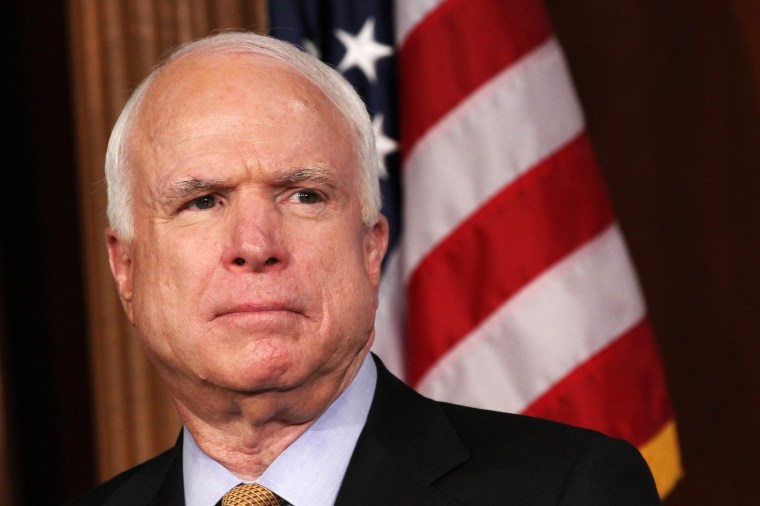John McCain may lose his Senate seat this November thanks to Donald Trump.
Trump’s inflammatory rhetoric has galvanized both Arizona’s far-right forces — who oppose their state’s growing immigrant population and hope to replace McCain with a more conservative Republican — and Democrats hoping to capitalize on Trump’s extreme unpopularity and flip the state’s seat blue.
McCain's future and the kind of compassionate conservatism he’s championed throughout his five-term Senate career are in big trouble.
Related: Trump Endorses Paul Ryan, John McCain at Wisconsin Rally
The forced alignment with Trump has been an exercise in humiliation for McCain, a decorated military veteran whose slogan as the 2008 Republican presidential nominee was “Country First.” McCain endorsed Trump this year even after the real estate baron made headlines by mocking McCain’s years as a prisoner during the Vietnam War. “I like people who weren’t captured,” Trump, who took five deferments to avoid Vietnam service, said of McCain.
This week, in an interview with the Washington Post, Trump conspicuously refused to return McCain’s favor — declining to endorse McCain in his Senate primary later this month — though days later amid party pressure, Trump reversed course and offered up a belated endorsement.
McCain has soldiered on, even when asked about Trump’s fight with the parents of a Muslim American Army captain killed in Iraq in 2004.
“I support the nominee of the party, and I'll tell you what — any time from now on, when that question was asked, if I change my mind, I'll let you know, OK?” McCain tersely told the press this week, when asked yet again if he still supports Trump.
McCain’s main primary rival is state Sen. Kelli Ward — whom Salon dubbed “Lady Trump” to her delight. Challenging McCain from the right, Ward has vowed to “mix the mortar to fix the border” herself. She has also championed Trump’s initial refusal to back McCain as an “unofficial endorsement” of her candidacy. She’s touting the endorsement of conservative firebrand Laura Ingraham ahead of the state’s Aug. 30 primary election.
Early polling showed McCain leading Ward in a crowded field of contenders, but the race is likely to tighten as stragglers drop out in the final weeks.
Strategists say McCain is likely to win the primary. But if it’s hard to split from the nominee Arizona’s Republican voters embraced in the presidential primary, it’s going to be even harder to defend that endorsement in a general election challenge against Democrats and minorities in the state who oppose Trump.
The top Democratic prospect for the seat, Rep. Ann Kirkpatrick, is already working hard to tie McCain to Trump’s polarizing brand of Republicanism and paint him as a spineless politician putting party above country.
Organizers are rallying Democrats and trying to register and mobilize the state’s growing population of Hispanic voters to boost Kirkpatrick. To hold onto his seat, McCain will have to shore up support with the Latino voters that have historically buoyed his candidacy. It’s a tough task, however, given Trump’s presence on the ticket and his racially charged rhetoric and repeated insinuations that Mexican immigrants are criminals.
Related: For Trump, the Problem Isn't the Message. It's the Messenger
Arizona, which last voted for a Democratic presidential contender in 1996, could be in play this year, making matters that much tougher for McCain. If polling shows favorable prospects for Democratic presidential nominee Hillary Clinton in Arizona, Democratic interest groups can be expected to flood the state with money and organizers.
“If Donald Trump is at the top of the ticket, here in Arizona, with over 30 percent of the vote being the Hispanic vote, no doubt that this may be the race of my life,” McCain said this spring in a recording of a private fundraiser obtained by Politico. “If you listen or watch Hispanic media in the state and in the country, you will see that it is all anti-Trump. The Hispanic community is roused and angry in a way that I've never seen in 30 years.”
Strategists say it won’t be an easy race, even as allies sound certain the dogged campaigner will win easily.
“Arizona voters absolutely can separate these two candidates. Trump’s base of support are Republican primary voters and that’s it. John McCain’s got independent support, Democrats who support him — he’s got twice the Hispanic support than Trump does,” Rick Davis, McCain’s friend and former White House campaign manager told NBC News.
McCain has represented the state in Congress since 1982, and strategists say that will make him safer than first- or second-term senators running for reelection under Trump’s shadow.
Davis said the senator has invested heavily in a strong ground operation, something the Trump campaign hasn’t done.
“I don’t think a Twitter account is going to hurt John McCain’s reelection,” Davis quipped, a nod to Trump’s strong presence on social media.
Other strategists warn that the conventional wisdom that says McCain should easily win both the primary and general elections resembles the wisdom that predicted former Florida Gov. Jeb Bush would be a heavy hitter in 2016 — right up until he dropped out of the presidential race.
“Arizona’s a perfect petri dish of what is likely to happen going forward. If they are likely to knock off John McCain, game over,” explained Mike Madrid, a Latino-focused Republican strategist who said the Arizona incumbent’s loss would signal a complete and devastating loss of minority support for the party at the hands of Trump.
Madrid said if McCain does win, his past support among Hispanics will be what keeps him in office and perhaps what carries the party into the future.
“If he is in fact successful, and the data suggests that’s more likely than not, then I think you have a road map for going forward,” Madrid said.

